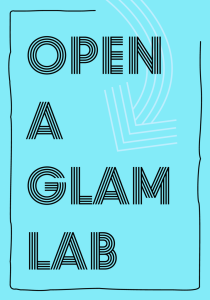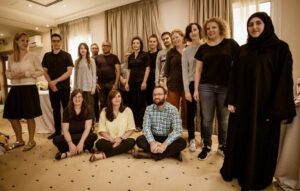Experiment & Innovate: ‘Open A GLAM Lab’ Book Launched
We are very happy to share the launch of the Open a GLAM Lab book: a freely-available publication which shares the experiences of 16 global ‘Labbers’ from across the globe.

It introduces readers to everything they need to know about setting up, maintaining and innovating a GLAM (Gallery, Library, Archive and Museum) organisation through a Lab.
Three members of LIBER’s Digital Humanities and Digital Cultural Heritage Working Group — Sarah Ames (National Library of Scotland), Caleb Derven (Glucksman Library University of Limerick) and Lotte Wilms (KB National Library of the Netherlands) — were among the 16 ‘Labbers’ who came from across the globe to author the book.
They met colleagues from the UK, Australia, the US, Denmark, Austria, Qatar, Spain and Belgium between 23-27 September in Doha, Qatar to collaboratively write the book using the Book Sprints method.
Quote from Open a GLAM Lab
Cultural heritage organisations have historically provided access to and preserve cultural heritage. The shift towards the digital has presented new opportunities for experimentation and innovation. The fast pace of technological developments impacts society and culture worldwide. Some institutions may not be ready for this. This is the world of GLAM Labs. Labs and Lab-style work challenge the traditional approach and use new, existing and emerging technologies to make their collections available in innovative, engaging and unexpected ways. Labs experiment, collaborate, take risks, sometimes fail, and always push boundaries.
Open a GLAM Lab, p. 32
The GLAM Lab Community
The book was written on behalf of the International GLAM Lab Community, in which many LIBER libraries participate. Would you also like to get involved? Please see their website for more information.

Authors
The 16 authors of the book are:
- Abigail Potter, Senior Innovation Specialist at the Library of Congress with the LC Lab working to support new and creative uses of digital collections that engage diverse audiences.
- Aisha Al-Abdulla, Section Head of the Digital Repository and Archives at Qatar University Library, managing the first Open Access Institutional Repository QSpace in the State of Qatar.
- Armin Straube, Teaching Fellow in Library and Information Studies at UCL Qatar. He is an archivist with work experience in data curation, digital preservation and web archiving.
- Caleb Derven, Head of Technical and Digital Services at the Glucksman Library, University of Limerick with overall responsibility for strategy and operations related to collections, digital resources and library systems.
- Ditte Laursen, Head of Department, Royal Danish Library, is responsible for the acquisition of digitally born cultural heritage materials, long-term preservation of digital heritage collections, and access to digital cultural heritage collections. She is also a board member of the Digital Humanities in the Nordic Countries.
- Gustavo Candela, Associate Professor at the University of Alicante and member of the Research and Development department at The Biblioteca Virtual Miguel de Cervantes.
- Katrine Gasser, Section Head of IT at KB Labs in the Royal Danish Library, managing a team of experts in programming, networking and research.
- Kristy Kokegei, Director of Public Engagement at the History Trust of South Australia oversees the organisation’s public programming, digital engagement, marketing, learning and education programmes across 4 state government-funded museums, supporting and enabling 350 community museums and historical societies across South Australia.
- Lotte Wilms, Digital Scholarship advisor managing the KB Lab and co-chair for the LIBER Working Group Digital Humanities and a board member of the IMPACT Centre of Competence.
- Mahendra Mahey, Manager of British Library Labs (BL Labs), an Andrew W. Mellon foundation and British Library-funded initiative supporting and inspiring the use of its data in innovative ways with scholars, artists, entrepreneurs, educators and innovators through competitions, awards and other engagement activities.
- Milena Dobreva-McPherson, Associate Professor Library and Information Studies at UCL Qatar with international experience of working in Bulgaria, Scotland, Malta and Qatar.
- Paula Bray, DX Lab Leader at the State Library of NSW is responsible for developing and promoting an Innovation Lab utilising emerging and existing web technologies to deliver new ways to explore the Library’s collections and its data.
- Sally Chambers, Digital Humanities Research Coordinator at Ghent Centre for Digital Humanities, Ghent University, Belgium and National Coordinator for DARIAH, the Digital Research Infrastructure for the Arts and Humanities in Belgium. She is one of the instigators of KBR Digital Research Lab at the Royal Library of Belgium.
- Sarah Ames, Digital Scholarship Librarian at the National Library of Scotland, responsible for the Digital Scholarship Service and the Data Foundry.
- Sophie-Carolin Wagner, Co-Founder of Research Institute for Art and Technology (RIAT), Co-Editor of the Journal for Research Cultures and Project Manager of ÖNB Labs at the Austrian National Library.
- Stefan Karner, Technical Lead of the ÖNB Labs at the Austrian National Library, co-responsible for developing a platform to provide access to some of the library’s data and metadata, for users to create and share annotations and other data.
Many thanks to the organisations that were able to sponsor this book sprint, UCL Qatar, Qatar University Library, The British Library and the Library of Congress.
Related news articles